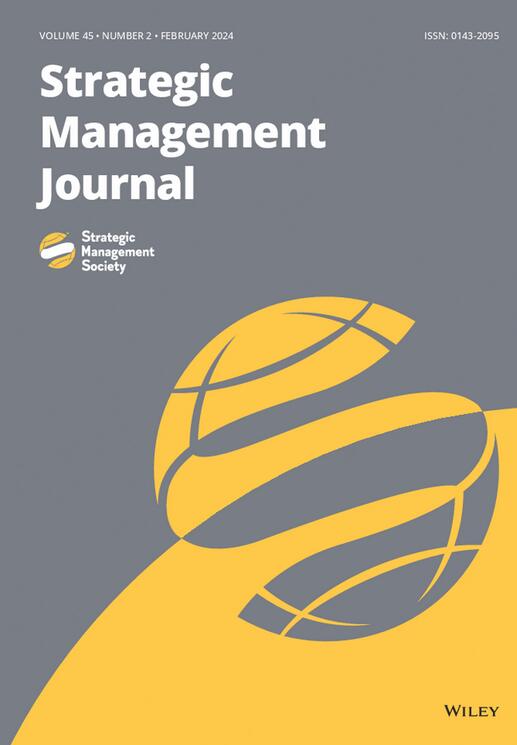强调积极?在高期望值的危害中采取战略性消极态度
IF 7.2
1区 管理学
Q1 BUSINESS
引用次数: 0
摘要
研究摘要以往的组织印象管理(OIM)研究侧重于突出公司的正面形象,而我们则探讨了首席执行官使用 "战略性消极 "来管理期望的情况。我们从组织印象管理的心理学根源出发,预测尽管存在 "积极 "的压力,但当首席执行官认为利益相关者有动机提高他们的期望值并有机会这样做时,首席执行官会战略性地使用消极性来抵消预期期望值的提高。我们在 370 家上市公司(2008-2019 年)的 7330 次季度收益电话会议上检验了我们的预测,研究了积极的重大盈利惊喜的 "动机 "和新财年的 "机会 "如何共同提高首席执行官在准备好的发言中的消极性。我们阐述了战略消极性的广泛适用性,即 OIM 现象的 "另一面"。管理学摘要与首席执行官通常向利益相关者 "积极转述 "公司情况的普遍观点不同,我们研究了首席执行官如何战略性地利用消极性来抵消利益相关者的乐观情绪,前提是首席执行官认为预期可能会急剧上升。我们认为,正面消息代表着一种 "动机",反思机会代表着一种 "机遇",两者结合在一起就有可能抬高预期。通过分析 370 家公司的 7330 次季度财报电话会议(2008-2019 年),我们特别研究了(1)积极的盈利惊喜和(2)新的财政年度如何迫使首席执行官们走出积极的舒适区,并鼓励他们在财报电话会议上发表战略性的消极言论,以试图降低利益相关者的预期。我们的研究结果支持这一观点,并为今后的研究铺平了道路。本文章由计算机程序翻译,如有差异,请以英文原文为准。
Accentuate the positive? Strategic negativity amid the hazard of high expectations
Research SummaryWhile previous organizational impression mnagement (OIM) research focuses on highlighting firms in a favorable light, we explore CEOs' use of “strategic negativity” to manage expectations. We draw on OIM's psychological roots to predict that despite pressure to “be positive,” when CEOs perceive stakeholders are motivated to raise their expectations and have an opportunity to do so, CEOs strategically use negativity to counteract this anticipated expectation increase. We test our predictions on 7330 quarterly earnings calls from 370 publicly traded firms (2008–2019), examining how the “motive” of a positive material earnings surprise and “opportunity” of a new fiscal year jointly increase CEO negativity in prepared remarks. We elaborate the wide applicability of strategic negativity, the “other side” of the OIM phenomenon.Managerial SummaryIn contrast to the prevailing view that CEOs usually “positively spin” the firm's situation to stakeholders, we investigate how CEOs strategically use negativity to counteract stakeholder optimism, provided CEOs perceive expectations are likely to rocket upward. We argue that positive news represents a “motive” and a chance to reflect represents an “opportunity,” and that together they risk raising expectations. Analyzing 7330 quarterly earnings calls of 370 companies (2008–2019), we specifically examined how both (1) a positive earnings surprise and (2) a new fiscal year force CEOs out of their positivity comfort zone and encourage them to be strategically negative in earnings call remarks, to try to lower stakeholder expectations. Our results support this view and pave the way for future research.
求助全文
通过发布文献求助,成功后即可免费获取论文全文。
去求助
来源期刊

Strategic Management Journal
Multiple-
CiteScore
13.70
自引率
8.40%
发文量
109
期刊介绍:
At the Strategic Management Journal, we are committed to publishing top-tier research that addresses key questions in the field of strategic management and captivates scholars in this area. Our publication welcomes manuscripts covering a wide range of topics, perspectives, and research methodologies. As a result, our editorial decisions truly embrace the diversity inherent in the field.
 求助内容:
求助内容: 应助结果提醒方式:
应助结果提醒方式:


